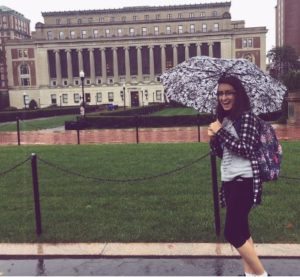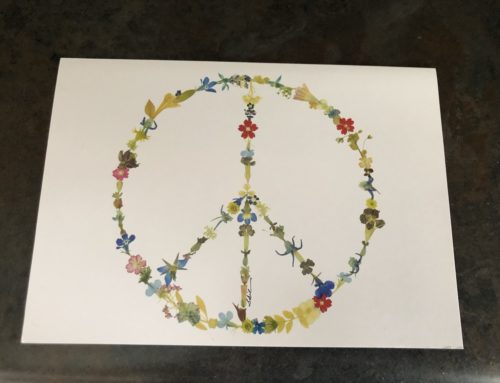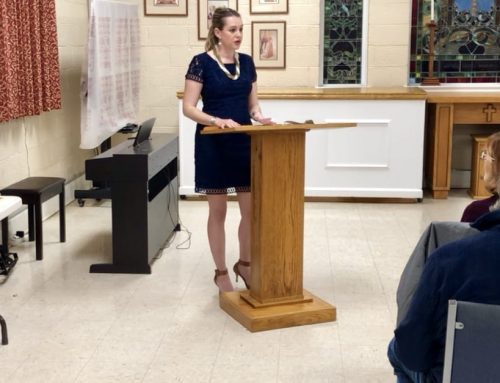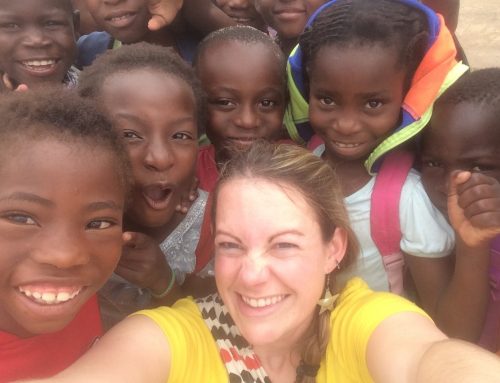Welcome to my Wednesday blog series exploring women’s careers, interests, and roles. Within this series, I explore how women of all ages, in all phases of their lives, make choices for themselves, their careers, their families, and their time, in general.

Jalileh Visiting Columbia
This week’s profile features an interview with Jalileh Garcia Cornell. I met Jalileh in June 2016 through the RESULTS network. We were introduced via email and grabbed coffee to meet in downtown Raleigh. At the time of our introduction, I didn’t realize I was being introduced to a 17 year old dynamo. Jalileh instantly impressed me and I could not wait to work with her in our shared advocacy interests. I could not believe how poised, prepared, and smart she was, at such a young age.
Originally from Honduras, Jalileh moved to North Carolina when she was 15, after living in Ohio for 5 years. Her story, as a young Honduran-American is particularly unique.
- What did you want to be when you grew up and how has that evolved, Jalileh?
I didn’t really know what I wanted to be, but I knew that I wanted to help others. As I became more involved with helping others, whether it was mentoring middle schoolers or speaking up for others, I realized I wanted to go to law school for international human rights law. - Where do you spend your days?
I am currently a senior at Garner Magnet High School, where I take part in the International Baccalaureate program, but my long-term goal is to become an international human rights lawyer. I will work towards this goal as I attend Columbia University this coming fall. - Outside of being a student and attending school, what are your best sources for learning?
I love social media such as Twitter, for it allows me to follow accounts that I find important to have information from. Some accounts include UN, Human Rights Watch, Huffington Post, or the New York Times. However, I think books are one of the best sources, as they tend to be less biased (sometimes!). My favorites are American Apartheid: Segregation and the Making of the Underclass and The World is Flat. I love attending conferences from time to time. One that appealed to me a lot was UNC’s Catalyst Conference, where I learned a lot about social justice. It particularly resonated with me because it educated me on issues like gender pronouns, LGBTQ rights, sexism in media, but felt passionately for after the conference. Additionally, last summer I attended the North Carolina Governor’s School where I studied social sciences. Interacting with people who have different exposure to social justice issues has broadened my way of seeing things. - What advantages, barriers, and motivators for women have you observed?
I grew up in Honduras, where women typically took the roles of housewife or caretaker. Though I have seen a change in it, I have observed that sometimes women feel succumbed to fill these roles for the better of the family. In the U.S. and Honduras, I have also seen barriers where women are stuck in abusive relationships. Because it is difficult to get away from these relationships, it becomes a barrier to achieve more. It, too, causes a lack of motivation. However, I have seen how mothers are oftentimes moved by their children. In order to provide for their children, they risk everything. Another advantage of being a woman is that I think they are personally more empathetic. - What is your passion and why is it important to you?
My passion is helping others, particularly in defending human rights. It is important to me because I have seen too many news stories such as the little boy from Aleppo or stories of the women in India whose human rights are constantly denied. These traumatic events continue to happening in the world, and people have become deafened by their own ignorance. Human rights are guaranteed to each and every one of us, for the mere fact that we are human. I intend to fight for them. - Those stories can be challenging. How do you feel most inspired?
I feel most inspired through the study of my religion, the Baha’i Faith, and through interacting with others. Being Baha’i means to love and serve others. By taking what I learn from my Faith, I take it to my interactions with others. I seek to love all, to listen to all, and to be understanding and tolerant of all. I have learned so much from just that. Because I understand we’re all human, I seek to help those that have been looked down upon. - What causes and organizations would you say that are you most passionate about?
RESULTS and the UN! I love being able to use my voice to create change in issues dealing with poverty, in particular through RESULTS Raleigh. I would love to work for the United Nations somehow and influence policy in other countries regarding human rights. - Throughout all of your experiences, who do you most look up to?
My mother is my biggest role model. Even though we are not very financially stable, my mother always puts my wants/needs before her own. She embodies strength in character and self. Without her example, I would be nowhere near where I am today. She is everything good and right in this world. - What are some of the biggest challenges you have faced?
Personally, I have been faced with many challenges at home regarding my complex relationship with my father. Being of part of a low-income family has also been a struggle as I am not always able to afford things I need. However, I find both of these things to be blessings as I have grown so much as a person because of it. Professionally, I feel like my skills have been doubted because I am a Latina. - Last one, what’s the best and worst advice you’ve ever received?
- Best Advice: You are the only person that stands between you and your goals. You are capable, don’t let others make you believe otherwise. You deserve every where you are going. Do not forget your worth.
- Worst Advice: You have to tell people what they want to hear.
Follow Jalileh on Instagram and Twitter in her journey in advocating for human rights and studying law. Please join me in wishing her a Happy 18th Birthday this coming Friday!
Thanks for reading Jalileh’s story. Share in the comments how it impacted you or share it on social media. Check out next week’s weekly post on Women & the Ways We Work. Know someone you think should be featured? Contact me and let’s chat.




Leave A Comment
You must be logged in to post a comment.